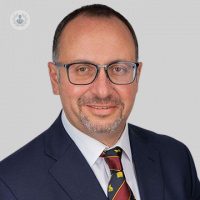An expert’s guide to acoustic neuroma
Escrito por:Acoustic neuroma, also known as vestibular schwannoma, is a type of benign tumour that can lead to serious complications if it is not quickly diagnosed and treated. In order to raise awareness this National Acoustic Neuroma Month, highly esteemed consultant neurosurgeon Mr Ramez Ibrahim tells us all about this condition.
What are acoustic neuromas, and are they life-threatening?
Acoustic neuromas are benign brain tumours that originate from the vestibular nerve in the ear. They can be life threating if they reach a large size. However, thanks to recent advances in treatment, these tumours can be recognised and treated early, before they can cause significant harm to the patient.

How do these brain tumours form?
These tumours start to grow from the vestibular nerve, which is the balance nerve in the ear. They originate from the coverings of the nerve, and grow very slowly over time, leading to hearing loss and tinnitus. If they are not diagnosed, they can lead to further complications such as brainstem compression, and even become life threatening.

How common are they, and are they easy to treat?
Acoustic neuroma (or vestibular schwannoma) tumours make up about 6% of all brain tumours. Some of them do not continue to grow after they first appear, so there is an option of just observing them in the first instance. However, if they prove to grow, they can be treated by surgery, or Gamma Knife radiation.
When would surgery be considered as a treatment option?
Surgery used to be the main option for treatment in the past, but because these tumours are being diagnosed earlier, it is becoming less and less employed. Surgery is still one of the treatment options for particularly large tumours. However, sometimes if the tumour is not completely resected, Gamma Knife radiosurgery would offer a very good option for treatment of any residual disease.
Are there any non-surgical treatment options? If so, what are they?
The non-surgical option for vestibular schwannoma is radiation treatment. The most popular, backed by the most research, is Gamma Knife radiation surgery. It has a very good response rate, and leads to very good tumour control. This means that the tumour does not continue to grow in 95% to almost 100% of cases over a ten-year period of follow-up.
Mr Ramez Ibrahim is a leading neurosurgeon, with over 25 years of experience in his profession. If you would like to book an appointment with Mr Ibrahim, you can do so via his Top Doctors profile.


